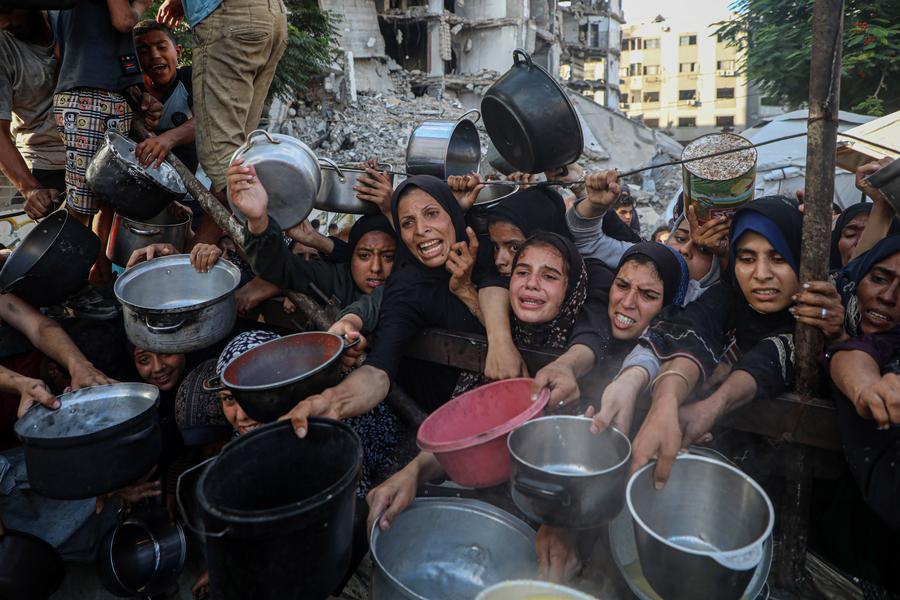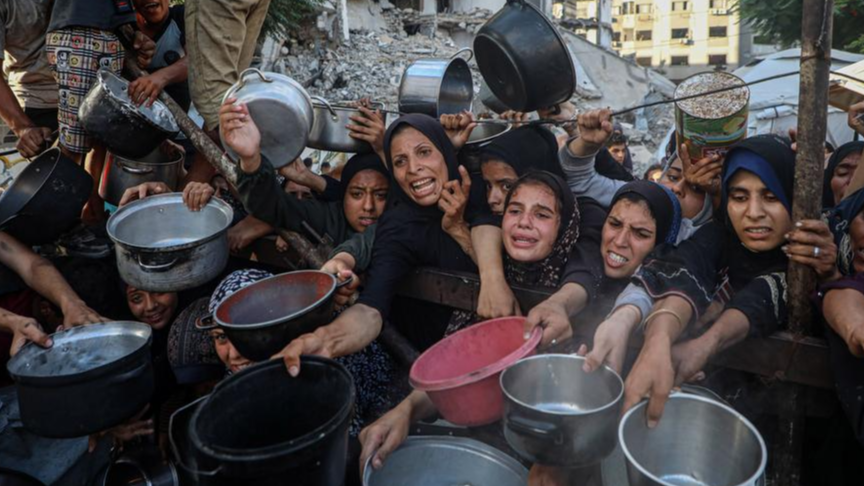
UNITED NATIONS/JERUSALEM/SANAA - Amid continuing hostilities in Gaza, Palestinians continue to be killed or injured as they seek food from militarized aid hubs, UN humanitarians said on Wednesday.
The UN Office for the Coordination of Humanitarian Affairs (OCHA) said there were reports of dozens of people killed or injured Wednesday at one of those hubs.
"In the past week, severe injuries continued to be reported among people seeking aid," OCHA said. "The World Health Organization (WHO) reported one instance where a 21-year-old man was paralyzed for life after being shot while trying to collect a bag of flour from one of the militarized hubs."
The WHO was referring to the Gaza Humanitarian Foundation (GHF), founded by a private US group and currently funded by the US government. Contrary to established international humanitarian norms for distributing relief in local communities, the GHF set up four sites in the whole of Gaza in restricted Israeli military zones, where starving civilians enter through fenced lanes under the eyes of armed security contractors. Chaos results in gunfire.
OCHA said that months of escalating hostilities in Gaza have increased risks for the most vulnerable, including people with disabilities and older adults, who struggle to access what they need to survive.
The humanitarians said one of their partners found in a survey that more than 80 percent of people with disabilities in Gaza have lost wheelchairs, hearing aids, walkers and other assistive devices, having to endure many challenges, including the denial of access to humanitarian aid, discrimination, stigmatization and exposure to explosive ordnance.
ALSO READ: Gaza truce not enough: UN head
The UN Population Fund (UNFPA) reported that domestic violence, sexual exploitation and abuse are on the rise in the Gaza Strip. Several safe spaces offering shelter, psychological support and coping mechanisms for women and girls have shut down or are functioning at reduced capacity.
UNFPA reported that the situation in Gaza is harrowing for women and girls. Pregnant women are delivering babies in the dark, with no electricity and no skilled care to treat potential complications. Thousands of mothers are starving.
OCHA said that in Al Mawasi and Gaza City, Doctors Without Borders reported treating more than 1,200 pregnant, breastfeeding women and children with severe and moderate malnutrition in their clinics. Between May and July, the number of people enrolled for treatment at its Gaza City clinic quadrupled, including hundreds of children under the age of 2, said the organization.
OCHA said that while small quantities of fuel entered Gaza again on Tuesday through the Kerem Shalom/Karem Abu Salem border crossing, severe supply shortages continue to threaten life-saving operations at hospitals, medical services and equipment, as well as telecommunications and water, sanitation and hygiene facilities.
"In northern Gaza, partners rehabilitated a well to try to address critical water shortages," OCHA said. "Although this will hopefully support patients and medical staff with hundreds of cubic meters every day, it is far from sufficient to meet people's needs."
UN agencies and their partners reiterated that hundreds of thousands of liters of fuel are critically needed every day to alleviate the crisis and address a dire situation.
OCHA said that after four months of sweeping Israeli restrictions on the entry of humanitarian assistance into Gaza, nearly all displacement sites reported people sleeping in the open, with no means of protection. No shelter supplies have entered during this period.
"This catastrophic situation must end. A ceasefire is long overdue," said the humanitarian office.

UN-led humanitarian action sidelined
Meanwhile, UN Children's Fund (UNICEF) Executive Director Catherine Russell said on Wednesday that the UN-led humanitarian response in Gaza has been sidelined since the breakdown of the ceasefire in March, even though the world body was doing a good job, said
"For the last several months, the UN-led humanitarian response has been sidelined despite the fact that during the March ceasefire, we were delivering assistance in an efficient and safe manner," she told a Security Council meeting on the humanitarian situation in Gaza.
Essential vaccines and neonatal care, lifesaving nutrition services, and access to clean water were affected, she said, and asked members of the Security Council to ensure that UNICEF and their humanitarian partners are allowed to do their jobs.
UN: Israel must follow same rules
Meanwhile, UN Under-Secretary-General for Humanitarian Affairs and Emergency Relief Coordinator Tom Fletcher said Wednesday that Israel must be held to the same principles and laws of all other states in terms of protection of civilians.
States and armed groups must uphold the rules -- forged because of the horrors of conflict and hatred -- that protect civilians in war, Fletcher told a Security Council meeting on the humanitarian situation in Gaza.
"Today, across the world, we watch these rules being corroded and degraded. Again, it is of course for you (the Security Council members) to decide how you act to ensure that all parties respect international humanitarian law. But I agree with some members of the Israeli Cabinet that you have consistently overestimated your powers of quiet persuasion," he said.
ALSO READ: Qatar says Gaza ceasefire talks in Doha 'ongoing, no timeframe'
New military corridor
Separately, Israel's military said on Wednesday it had established a new military road in the Gaza Strip, bisecting eastern and western Khan Younis in the south of the strip.
In a statement, the military said the so-called "Magen Oz Corridor" is "a key component in applying pressure on Hamas and achieving the decisive defeat of its Khan Younis Brigade."
The corridor, which stretches about 15 km, is the fourth such route Israel created by razing buildings and infrastructure to divide the enclave. These strips of land have been a major obstacle in previous ceasefire negotiations, with Israeli Prime Minister Benjamin Netanyahu vowing not to withdraw forces from several of them.
Houthis claim attack on Ben Gurion Airport
Yemen's Houthi armed group said on Wednesday night that they targeted Israel's Ben Gurion Airport with a ballistic missile and two drones in a new attack carried out earlier in the day.
Houthi military spokesperson Yahya Sarea said the attack forced the air traffic of the Israeli airport to halt temporarily and led thousands of Israelis to run to shelters. "The attack achieved its goal," Sarea said in a televised statement aired by Houthi-run al-Masirah satellite TV channel.
He said that the group fired two other bomb-laden drones toward the Negev desert, targeting what he said an "Israeli military target." The Houthi group also hinted that it can target the Israeli nuclear installation located in the Negev desert, about eight miles southeast of the city of Dimona.


